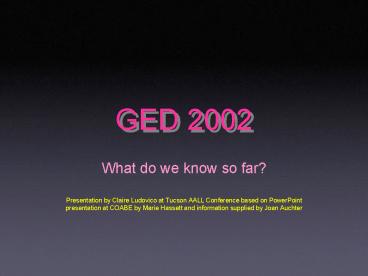GED 2002 - PowerPoint PPT Presentation
1 / 39
Title:
GED 2002
Description:
Presentation by Claire Ludovico at Tucson AALL Conference based on PowerPoint ... What's happening with the new GED? Percent who passed: Overall on GED 2002: 64 ... – PowerPoint PPT presentation
Number of Views:510
Avg rating:3.0/5.0
Title: GED 2002
1
GED 2002
- What do we know so far?
- Presentation by Claire Ludovico at Tucson AALL
Conference based on PowerPoint presentation at
COABE by Marie Hassett and information supplied
by Joan Auchter
2
Whats happening with the new GED?
3
Percent who passed
- Overall on GED 2002 64
- Overall on 1988 version of GED 69
4
Passing Percentages
5
Passing Percentages by Age
6
Average Scores
7
Average Score Disparities
158
176
160
158
171
8
Re-TestPassing Percentages
9
Average Scores
10
Non-Passers v. Retesters
62
71
53
48
54
Dark blue numbers show percent passing on Retest.
11
Passers, Non-Passers Retesters
62
71
53
48
54
Dark blue numbers show percent passing on Retest.
12
Who Passes the GED?
- 18-24 year olds (53)
- Primary Language English (97)
- Eleven or more years of school (43)
- Out of school 2 or fewer years (47)
13
Who Takes the GED?
- 20-39 year olds (53)
- Ten or fewer years of school (63)
- Primary Language?
- Years out of school?
14
Why do they take the GED?
- Personal Satisfaction
- Better Job
- Further Education
15
Top 5 reasons for leaving school given by those
with 8th grade education or less
- Did not like school
- Needed money to help at home
- Bored
- Poor teaching
- Teachers did not help enough
16
Top 5 reasons for leaving school given by those
with 9th grade education or more
- Poor teaching
- Did not like school
- Needed money to help at home
- Teachers did not help enough
- Parents did not support my education
17
Top reasons for leaving school given by those
who passed the test
- Absent too many times
- Bored
- Got a job
18
Top reasons for leaving school given by those
who did not pass the test
- Didnt get it
- Didnt understand math
- Teacher didnt help
19
What do Passers Non-Passers Have in Common?
- Low Writing Scores (467/296)
- Low Math Scores (485/327)
20
Language Arts, Writing
21
Essay Scores
71
57
20
13
3
3
3
8
8
7
1
1
5
22
Mathematics
23
Percent Correct Math
24
Social Studies
25
Science
26
Language Arts, Reading
27
Average Scoresof passers, non-passers, and
retesters
28
Why do Writing Math scores improve on retest,
while Content Area scores do not?
29
Reading Comprehension
- On the basis of the information in the poem, what
will the speaker do next? The speaker will - set up camp for the night to protect himself and
his horse - try to buy the land from the owner
- continue traveling so he can meet his obligations
- stay where he is and watch the snow in the woods
- turn around and go back where he came from
30
Components of Reading
Vocabulary
Prior Knowledge
Meaning Skills (Comprehension)
Print Skills
Reading Rate
Decoding Skills
31
Why Reading Matters
- dntf th wrds n ths lst dffdl,
Wshngtn, cmptr, qut, rd. - Lrnng s th ndspnsbl nvstmnt rqurd
fr sccss n th nfrmtn g w r
ntrng.
32
Strategies to Improve Learner Performance
33
- Daily exposure to a variety of texts.
- Vocabulary instruction that includes a variety of
complementary methods designed to explore the
relationships among words and the relationships
among word structure, origin, and meaning. - Comprehension strategies that include prediction
of outcomes, summarizing, clarification,
questioning and visualization. - Frequent writing to enable deeper understanding
of what is said.
34
Problems with social studies, science, and
reading
- SOCIAL STUDIES reading a passage and
understanding the gist of it, then applying that
concept to a different situation - SCIENCE understanding basic science concepts
(especially in physics) and applying those to
concrete situations - READING questions that require the integration
of new information about the piece or about the
author with the passage on the test
35
Some suggestions for social studies, science, and
reading
- Try scaffolding have students determine
- Literal understanding of passage (restate ideas,
check focus statement title of passage) - Interpretive understandingwhat else does student
know about this writer or this piece who, where,
when, attitude? - Applied understanding how do these fit with
answers to question? - Try some simple science experiments or discuss
science principles in terms of everyday
activities.
36
How about the math test?
- Biggest problem is application can they choose
the correct procedure to answer question? - Real world problems are often missed
37
Suggestions for improving math
- Discuss how to solve problems
- Discuss relevant words in the problem
- Use realia to create real world problems
38
Suggestions for improved scores on writing skills
multiple choice
- Practice construction shift questions have
student read stem and each choice of ending
together - Students need to be given authority to remove
non-relevant sentences from text try taking
realia and polluting it. - Have students check each statement against focus
statement (title of passage) for relevancy
39
Any thoughts?
- Thanks for coming!
- Special thanks to Brite Lee
- and Marie Hassett, Ph.D.
- Steck-Vaughn Publishers
- And to Joan Auchter, GEDTS































